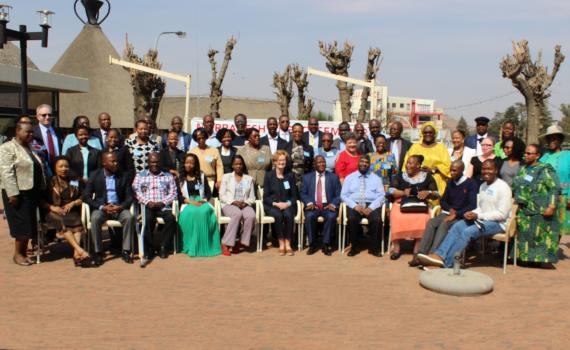
To fulfill the promise of the right to read for people with print disabilities, EIFL supports take-up in partner countries of the Marrakesh Treaty (official name: Marrakesh Treaty to Facilitate Access to Published Works for Persons Who Are Blind, Visually Impaired, or Otherwise Print Disabled).
The Marrakesh Treaty gives institutions, such as libraries, the right to make accessible format copies (for example, Braille, audio, large print and digital accessible formats) of copyright-protected works, and to exchange these works across national borders for beneficiaries.
EIFL has worked with the Lesotho Library Consortium (LELICO) on copyright issues since 2005. LELICO took the lead in advocating for adoption of the Marrakesh Treaty by the Kingdom of Lesotho.
As a result, the government deposited its instrument of accession at WIPO (the World Intellectual Property Organization) in April 2018, and the treaty entered into force in Lesotho on 30 July 2018. Lesotho became the 37th country in the world, and the ninth country in Africa to join the Marrakesh Treaty.
Now the Marrakesh Treaty should be implemented into national law so that libraries and other authorized entities can start to use the treaty and people in Lesotho with print disabilities can finally benefit.
Background
According to the 2006 Population and Housing Census, an estimated 3.7 per cent of the population of Lesotho has some form of disability (the percentage of children with disabilities is said to be higher). The most prevalent forms of disability relate to visual and hearing impairment. Disabled people in Lesotho face daily challenges getting access to education, employment and health care, and are among the most marginalized and disadvantaged groups in the country.
Two schools in Lesotho’s capital city, Maseru, provide primary and secondary education to blind and visually impaired children from all over Lesotho.
The lack of accessible reading materials – known as the ‘book famine’ - is partly a result of barriers created by copyright law, barriers that the Marrakesh Treaty seeks to remove.
By removing copyright law barriers to accessible information and culture, the Marrakesh Treaty also helps to implement important provisions of the UN Convention on the Rights of Persons with Disabilities that was ratified by Lesotho in 2008 (including in particular Article 9 Accessibility, Article 21 Freedom of expression and opinion, and access to information, and Article 30 Participation in cultural life, recreation, leisure and sport).
Timeline
2016 – ongoing
Main activities and achievements
- In May 2016, EIFL reviewed the Lesotho Copyright Order, 1989, concerning provisions on disability as well as libraries. The copyright law review was one outcome of a workshop organized by LELICO and the Registrar General’s Office in February 2016. Other recommendations from the workshop included the need to raise awareness among policy-makers and parliamentarians to build political support for the Marrakesh Treaty.
- On 12-13 September 2017, EIFL, LELICO and the Registrar General’s Office co-organized a high-level seminar 'Ending the book famine in Africa: libraries and the promise of the Marrakesh Treaty’ in Maseru. The seminar was attended by 70 people including Ministers and Members of Parliament in Lesotho, inter-governmental organizations, copyright officials from Botswana and Kenya, copyright experts, teachers, librarians, and representatives of people living with disability. During the seminar, a national action plan 2017-2018 for implementation of the Marrakesh Treaty in Lesotho was drafted.
- On 1 November 2017, the Minister of Education and Training, Honourable Mokhele Moletsane, who participated in the seminar in Maseru, announced that Lesotho would ratify the Marrakesh Treaty at the 39th Session of the General Conference of UNESCO. In his statement the Minister noted the importance of the September 2017 seminar in encouraging adoption of the Treaty.
- On 30 April 2018, Lesotho deposited its instrument of accession at WIPO in Geneva. The Treaty entered into force in Lesotho on 30 July 2018 (read EIFL news, 'Lesotho adopts the Marrakesh Treaty').
Next steps
The next step is implementation of the Marrakesh Treaty into national law - the copyright law should be amended to ensure that an accessible format copy may be made and supplied to a print-disabled person or an institution, such as a library, within Lesotho and across national borders with other Marrakesh countries. EIFL is ready to support this vital next step to realize the benefits of the treaty.
FIND OUT MORE
- Read EIFL’s interview with Professor Matseliso Moshoeshoe-Chadzingwa, University Librarian at the National University of Lesotho and chairperson of LELICO, about copyright law reform in Lesotho. The interview was published in the EIFL Annual Report (2016).
- Read The Right to Read - how EIFL is supporting ratification of the Marrakesh Treaty in partner countries and implementation of the Treaty into national law.





